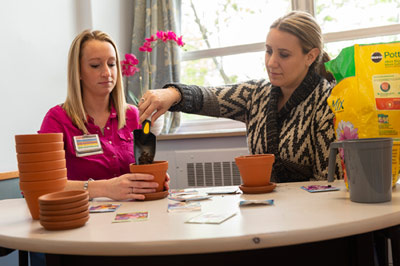Our Team
Eating Disorders Program
Leadership Team
Our multidisciplinary team includes clinicians who are specially trained in the unique needs of individuals with eating disorders:
- Psychiatrists with extensive knowledge and training in the field of eating disorders. Psychiatrists are responsible for the oversight of the entire care team and coordinate patient care, provide psychotherapy and monitors medication.
- Physician specialists, including gastroenterologists and cardiologists, are also available for consultations as needed for the treatment of other medical issues which often accompany an eating disorders diagnosis.
- Registered nurses, who carry out the plan of care and provides support on a 24/7 basis. Nurses also lead support groups focusing on topics such as medication education, stress management, coping skills, art expression, journaling, recovery tools and meal time processing. They also lead a support group for parents.
- Therapists, who provide individual, group and family therapy and arrange for follow-up care after discharge. Therapy groups cover a range of topics such as social media, body image, assertiveness, social skills, spirituality and psychotherapy. They also lead a multifamily psychoeducation group for inpatients and their families and a weekly support group for community members.
- Registered dietitians, who work with patients to promote healthy eating through individual and group nutrition therapy. Topics may include meal planning, nutrition education and food preparation basics.

- Occupational therapists, who perform an evaluation of patients’ ability to perform daily activities and develop a program to get them back on track. We are one of only a few eating disorders programs to have occupational therapists as part of our inpatient and outpatient care team.
- Case managers, who work with the care team to coordinate services and prepare patients for discharge. The case manager is also the liaison between patients and insurance and/or managed care companies.
-
Creative arts therapists provide mental health/behavioral health service that supports clients using music and visual art materials combined with counseling techniques. These therapeutic groups help uncover and express difficult emotions and experiences, provide a sense of joy and wellness, can help to reduce symptoms of stress and build communities through creative acts.
- Teachers, who work with school-age patients to keep them current in their academic studies.
- Pet therapy volunteers, who visit patients on weekends.
